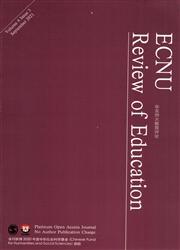Ignorance as a Method: Rethinking Academic Burden in an Accelerated Society
IF 2.6
Q1 EDUCATION & EDUCATIONAL RESEARCH
引用次数: 0
Abstract
This study applies “ignorance” as a theoretical lens to understand students’ academic burden in China as well as the value of free time in social acceleration. The article argues that students’ learning gradually became alienated in different times and spaces. It uses Rosa's social acceleration theory to analyze the logical paradox of the burden reduction policy in China and Benner's plasticity and self-activity principles to highlight the pedagogical value of leisure and free activities. The findings suggest the need to maintain the “necessary ignorance” in leisure activities and intervene less in student learning. In this respect, “ignorance” can be viewed as a cognitive method to protect leisure time and rebuild a spontaneous order in learning, which can close the gap caused by the impossible synchronization of specific parties in the education system. Ignorance opens the door to learned spaces, providing more opportunities to reduce academic burden in an accelerated society and stimulate the imagination of education. This study reveals the plasticity and self-activity that students develop in free leisure time and space, and reworks the key concept of “inevitable ignorance” expounded by Friedrich Hayek into “necessary ignorance” with pedagogical and ethical meanings. The reconceptualization of academic burden opens up new ways of thinking about educational policy and educational practice.无知是一种方法:加速社会中对学业负担的再思考
本研究以“无知”为理论视角来理解中国学生的学业负担,以及自由时间在社会加速中的价值。本文认为,学生的学习在不同的时间和空间中逐渐异化。运用罗莎的社会加速理论分析中国减负政策的逻辑悖论,运用本纳的可塑性和自我活动原则突出休闲和自由活动的教育价值。研究结果表明,有必要在休闲活动中保持“必要的无知”,减少对学生学习的干预。在这方面,“无知”可以被看作是一种保护闲暇时间、重建学习自发秩序的认知方法,它可以弥补教育系统中特定各方不可能同步所造成的差距。无知打开了通往学习空间的大门,在加速发展的社会中为减轻学业负担提供了更多的机会,激发了教育的想象力。本研究揭示了学生在自由闲暇时间和空间中发展的可塑性和自我能动性,并将哈耶克所阐述的“必然无知”这一核心概念重新诠释为具有教育学和伦理学意义的“必要无知”。对学业负担的重新界定为教育政策和教育实践开辟了新的思路。
本文章由计算机程序翻译,如有差异,请以英文原文为准。
求助全文
约1分钟内获得全文
求助全文
来源期刊

ECNU Review of Education
Social Sciences-Education
CiteScore
4.90
自引率
0.00%
发文量
41
审稿时长
10 weeks
 求助内容:
求助内容: 应助结果提醒方式:
应助结果提醒方式:


